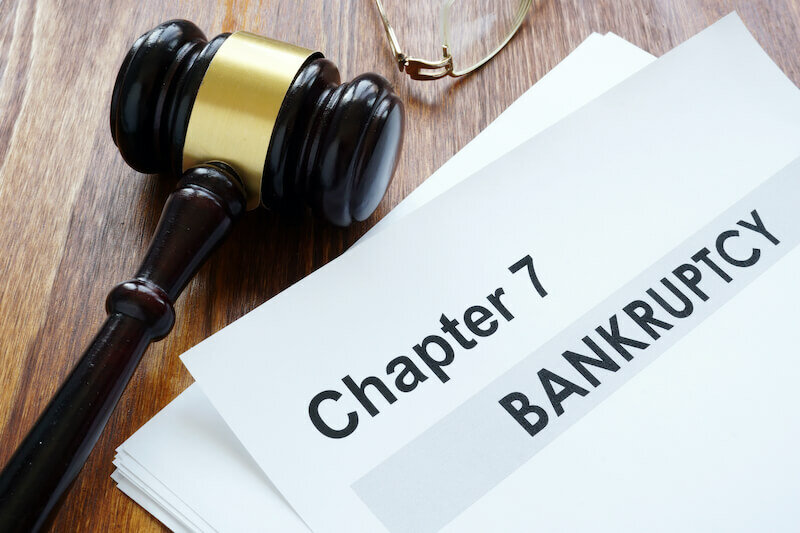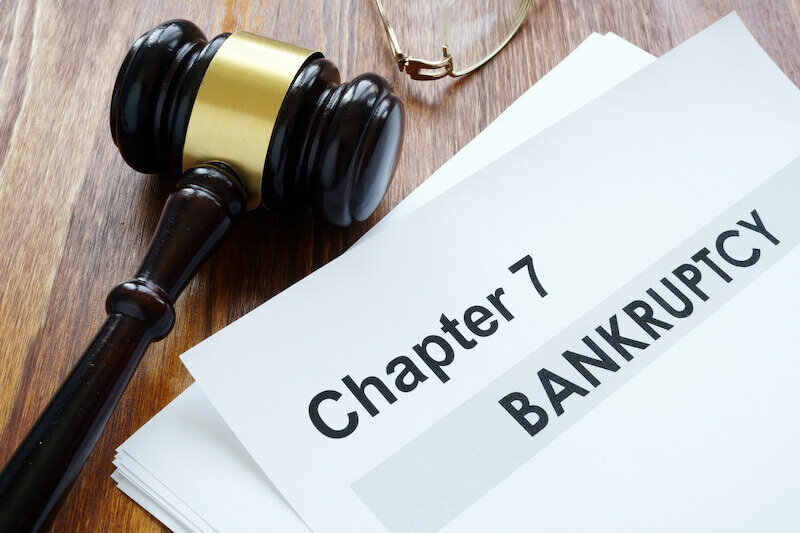One of the most popular myths regarding bankruptcy is that once declared, your life will never be the same. However, this does not have to be the case.
Bankruptcy allows people in financial distress to start again. Whatever form of bankruptcy you select, the procedure is intended to assist you in eliminating or paying down part or all of your obligations.
You are free to sell whatever assets you still possess, including your house, as soon as the bankruptcy is completed. Selling a house while in bankruptcy is more difficult since you will need approval from the court.
If you’re considering selling your home after you’ve received debt relief, here are the answers you’ve been looking for. Below, you can learn more about Chapter 7 and if you can still sell a house after filing Chapter 7 bankruptcy in Pennsylvania.

What Is Chapter 7 Bankruptcy?
Chapter 7 bankruptcy, often known as liquidation or straight bankruptcy, is a kind of bankruptcy that allows most unsecured debts to be discharged. If you’re behind on your bills and can’t afford living costs and monthly payments, filing for Chapter 7 bankruptcy may be your only choice for getting your finances back on track. However, you may be compelled to give up some of your possessions, which will have a long-term negative impact on your credit reputation.
When you declare Chapter 7 bankruptcy, the tribunal automatically issues a temporary injunction against your current debts. This prevents creditors from repossessing property, collecting payments, evicting you, or shutting off your utilities. According to PA property tax laws, the tribunal will seize your possessions and designate an administrator to manage your case.
The administrator’s responsibility is to examine your assets and finances and to supervise your Chapter 7 bankruptcy. They’ll liquidate nonexempt property that the bankruptcy court will not allow you to keep and use the proceeds to repay your creditors. The administrator will also schedule and conduct a creditor meeting for you and your lenders, during which you will be present at a courthouse and respond to questions about your petition.
Bankruptcy Laws in Pennsylvania
Pennsylvania bankruptcy state laws define six different forms of bankruptcy. Which one the debtor should petition for is determined by who is making the claim and the debtor’s overall aims. The vast majority of situations come under Chapter 7, Chapter 11, or Chapter 13.
1. Chapter 7: Liquidation
Individuals, small enterprises, and major corporations can all petition for Chapter 7 bankruptcy. Bankruptcy filers for Chapter 7 bankruptcy protection are compelled to liquidate their assets in order to settle any remaining unsecured obligations. According to Pennsylvania bankruptcy legislation, an administrator will be appointed by the federal courts, who will sell assets in the order of “absolute priority” as outlined in Section 1129(b)(2) of the United States Bankruptcy Code.
2. Chapter 9: Municipalities
Chapter 9 bankruptcy is only available to financially challenged municipalities, which include villages, towns, boroughs, and cities. According to Pennsylvania bankruptcy regulations, towns are never compelled to liquidate assets to settle any debts. Instead, the courts will establish a repayment plan in which the outstanding debt will be paid back over time.
3. Chapter 11: Large Reorganization
Generally, Chapter 11 bankruptcy is reserved for major corporations. Individuals with extraordinarily substantial outstanding debts, on the other hand, might petition for this form of claim. The unpaid balance is not immediately settled through the sale of assets in a reorganization bankruptcy, often known as a “reorganization bankruptcy.” Instead, the court-appointed administrator restructures the obligations while business as usual continues.
4. Chapter 12: Family Farmers
Chapter 12 bankruptcy is only utilized by family farmers and fishermen who have a consistent annual income. This type of bankruptcy, like Chapters 9 and 13, operates by developing a repayment plan to settle any pending bills back to the debt collectors. The repayment arrangements are available for up to five years, during which time business can continue as usual.
5. Chapter 13: Repayment Plan
Individuals and corporations can both file for Chapter 13 bankruptcy. It is an excellent alternative for anyone who wants to maintain all of their property, including items not included in Pennsylvania bankruptcy exemptions. The whole outstanding sum will be reimbursed to the creditor throughout this time period. This means that the debts will persist for up to five years, but you will be able to keep everything exempt and non-exempt property.
6. Chapter 15: Cross-Border Cases
Only in cross-border instances is Chapter 15 bankruptcy used. Examples include situations in which the debtor resides in one nation while their assets are held in another. It’s also possible that the creditors are based in another country. It is one of the most recent changes to Pennsylvania bankruptcy rules, designed to facilitate effective communication between the United States and another foreign country.
How Long Does It Take to Sell a House After Chapter 7 Bankruptcy?
Different state rules and types of bankruptcy filings govern how quickly you may sell your home after filing for bankruptcy. If the court permits, you may be able to sell your house at the bankruptcy hearing as soon as 30 days after filing bankruptcy. However, depending on the specifics of your case, you may need to wait three to six months after filing bankruptcy before selling your home.
You could qualify for a homestead exemption depending on where you reside. The homestead exemption protects some of your equity from creditors in Chapter 7 bankruptcy. If the combined sum of your exemption and your mortgage debt exceeds the value of your property, the court is unlikely to order a sale.
After three to six months, a Chapter 7 bankruptcy is typically discharged. Individual bankruptcy cases, on the other hand, have a plethora of unique elements. The court may impose certain conditions that would postpone the instant sale of a residence, such as the removal of any liens or judgments acquired against it.
Bankruptcy remains on your credit report and has a negative impact on your credit score for up to ten years. Conventional mortgage lenders may bar you from obtaining a new mortgage for up to four years after your bankruptcy has been resolved. The FHA will guarantee a mortgage two years following a bankruptcy discharge, but only for borrowers who have reestablished strong credit history. Even if you sell your house, you might not be able to buy a new one straight away.
For most applicants, FHA, USDA, and VA loan programs are the best options. However, keep in mind that factors such as your credit score, funds or lack thereof, and foreclosure can all have an impact on your ability to obtain a new home loan.

Who Is Involved in Chapter 7 Bankruptcy?
1. The debtor
The debtor is the one who files the Chapter 7 or Chapter 13 bankruptcy. Typically, the debtor has fallen on hard times and needs the protection of the bankruptcy court in order to achieve a fresh start. The debtor must supply all of their financial details, as well as a complete accounting of all transactions over the previous several years. Since it is exempt, the debtor usually gets to keep all of their property.
2. The bankruptcy trustee
Most individuals are unaware of who the bankruptcy trustee is or what function they play in the bankruptcy process, despite the fact that the trustee plays a critical role. The bankruptcy trustee’s responsibility is to sell any real estate that the debtor cannot exempt (or protect) from sale in the bankruptcy and then distribute the proceeds to creditors. Usually, no money is available to disburse to creditors.
3. The debtor’s attorney
The debtor’s attorney advises the debtor, organizes all of the debtor’s information, and reviews the debtor’s financial history. This ensures that the debtor receives a discharge without difficulty.
The debtor’s attorney not only handles all of the paperwork but also works with the debtor to ensure that any possible concerns in the debtor’s financial status are resolved before the case is filed.
4. The judge
The majority of people who petition for bankruptcy never meet with a judge. A judge is assigned to each case, but unless there is litigation (which seldom occurs), the debtor will never meet with the judge. The judge issues any orders in the case, such as the discharge order, and rules on any disputed points.
Endnote
If you have sold a house and plan to file for bankruptcy, or if you expect to sell soon, an experienced consumer bankruptcy attorney can advise you on how a bankruptcy court in your jurisdiction would likely regard the sales profits.
There is no legislation that precludes you from purchasing a home after filing for bankruptcy. However, you may discover that most lenders would be unwilling to sanction any new loan in your name if you make an attempt to do so.
Every debtor aspires for a bankruptcy discharge from the minute he or she files for bankruptcy. Filing for bankruptcy will leave an imprint on your life, but if you manage the matter with care and patience, you can get your life back on track.
If you’re looking for companies that buy houses in Springfield or you want to move out of state and sell your house, Problem Property Pals has your back. We are cash home buyers in Pennsylvania. Additionally, we buy houses in Philadelphia, so feel free to reach out to us today!


 Call Us!
Call Us!